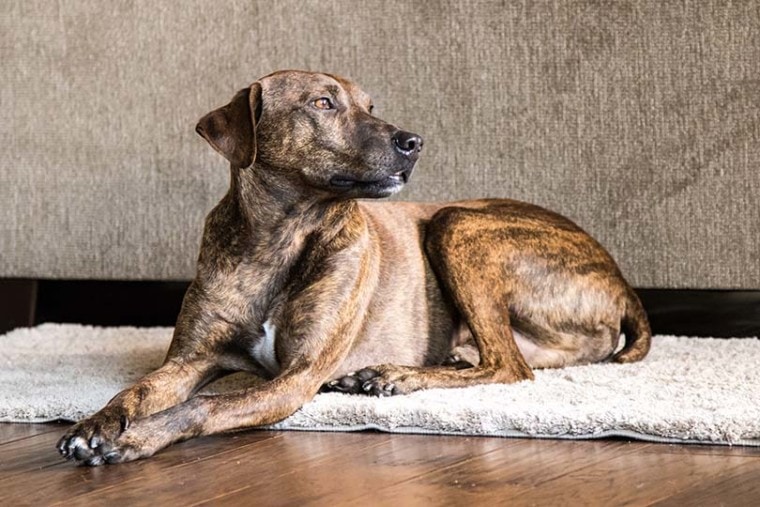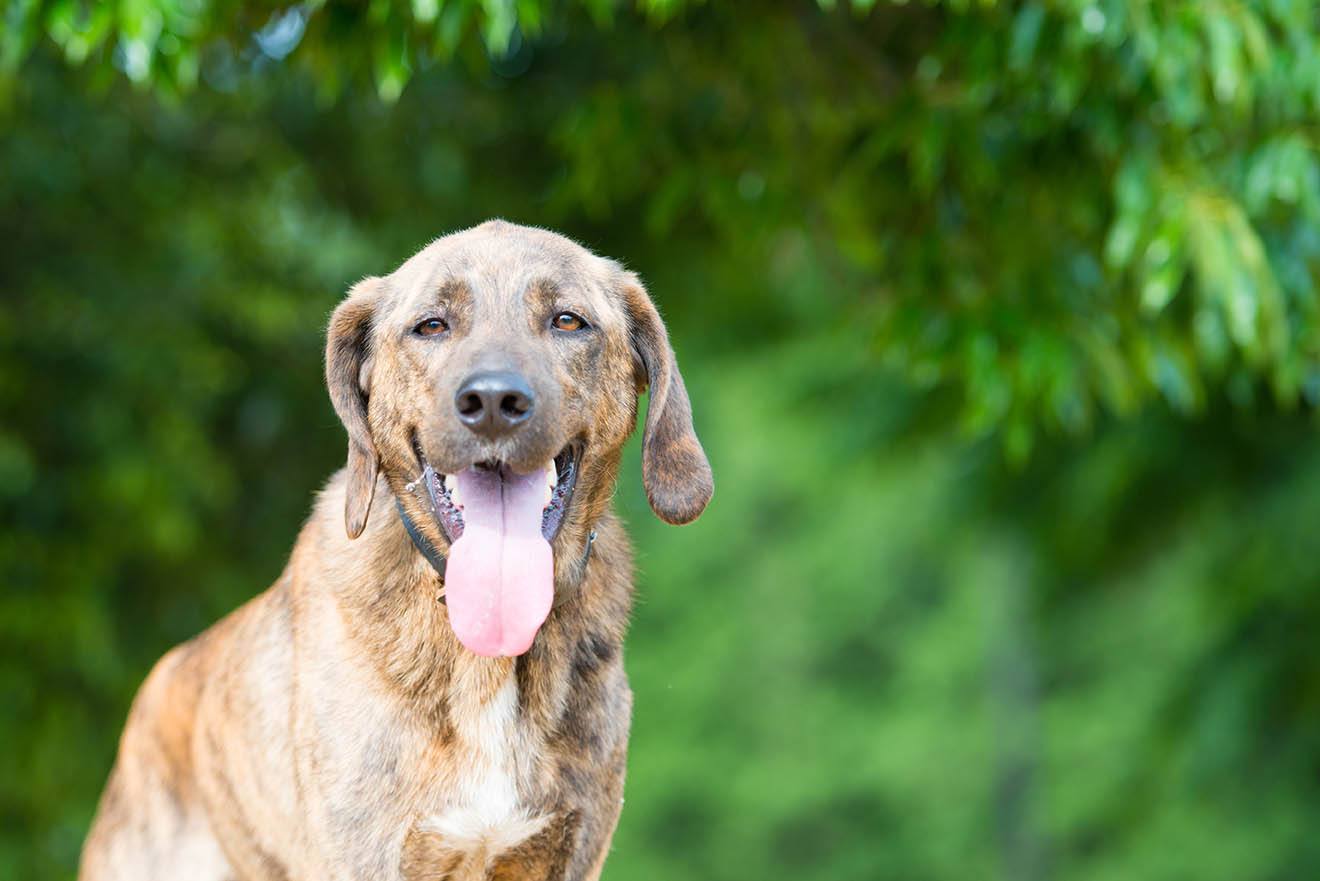
Click Below to Skip Ahead
The Plott Hound, also called the Plott, is a German-American dog bred for hunting alone and in packs. With its strong frame and its rugged endurance, it makes a tough but loyal companion.
Breed Overview
Height:
20-25 inches
Weight:
40-65 pounds
Lifespan:
11-13 years
Colors:
Black, black and tan, brown, red, and blue
Suitable for:
Hunters and hikers, multi-dog households, families with children, experienced owners
Temperament:
Loyal, alert, curious, protective
Plott Hounds aren’t for everyone—their strength, energy, and stubbornness mean they are best for experienced owners. Plott Hounds can be aggressive towards strangers if they aren’t well socialized, but owners who earn their Plott’s trust will find he is worth the work.
Plott Hound Characteristics
Plott Hound Puppies
Plott Hound puppies can be found in breeders. Make sure to ask many questions to your breeder and visit the facilities to ensure their ethical practices. Lower-price puppies often come from disreputable breeders and should be avoided. Unusually low prices for puppies often signal that the breeder does not properly care for the dogs in his care.
You might also be able to find a Plott Hound from a rescue organization or shelter. If adopting a Plott Hound, beware of poorly socialized dogs as Plott Hounds are among the breeds known to have a tendency towards aggression. Although aggression can often be socialized out of a dog at any age, this type of intensive socialization is not recommended for most owners.
Plott Hounds are a relatively healthy breed with no tendency towards major health problems, but they still need occasional vet check-ups, treatment for injuries, and vaccinations. Like any dog, breed healthiness is not a guarantee, so unexpected health difficulties may arise, especially later in life.
Temperament & Intelligence of the Plott Hound

Plott Hounds are active, alert, loyal dogs of average intelligence. They make ideal guard dogs because of their protective nature but might require some training to be comfortable around new people. They are fearless against aggressors and known to actively defend homes from intruders, making them a great choice for those who worry about their family’s safety. Some Plott Hounds can become aggressive if poorly socialized. They also can be anxious and grow easily frustrated by high-conflict environments. Plott Hounds do best with an experienced dog owner who can be calm and assertive. Because of their size and protective instincts, owners should be sure their dog is well socialized and that they are capable of controlling a poorly behaved dog.
Are These Dogs Good for Families? 👪
Plott Hounds often get along well with families when they are well socialized. Some say that Plott Hounds have a tendency towards aggression, but the risk of aggression is only high if improperly socialized. Because Plott Hounds are generally protective and very active, they make great playmates for children. Plott Hounds love to run and play outdoors with older children and teenagers. They will accompany a family member for hours of walking, hiking, or running. They also can be taught to get along well with small children.
Does This Breed Get Along with Other Pets?
Plott Hounds get along well with other dogs, often accepting them easily as part of the family. They were originally bred to hunt in packs, making it easier for them to socialize in multi-dog households. They can also get along well with cats and small animals, however, because of their hunting background they have a high prey drive. Even with high socialization, some Plott Hounds find it difficult to avoid chasing small pets. The ability to get along well with small animals depends on socialization, temperament, and household happiness.
Things to Know When Owning a Plott Hound:
Food & Diet Requirements 🦴
The Plott Hound is a big dog with a big appetite. You should expect to feed your Plott Hound about 2 to 3 cups of food a day. Food should be high quality and nutritionally balanced. Food can be split into two or three meals.
Exercise 🐕
Plott Hounds are very active dogs. They require at least an hour of exercise a day and do well in homes with a large backyard or dog run available to work energy out. Plott Hounds were bred to be farm and hunting dogs, so having space and freedom to run is essential. Because of their size and energy needs, it is difficult to keep Plott Hounds in a small apartment. Plott Hounds make great companions for hunting and hiking as they have the energy and endurance to cover rough terrain. They love exploring and are highly curious, so taking different walking routes or bringing your Plott Hound to new places is a great way to increase engagement.
Training 🎾
Plott Hounds are relatively easy to train, especially for an owner with experience in training other dogs. They are often eager to please and when a Plott Hound has a strong bond with its owner, they can pick things up very quickly.
However, Plott Hounds also have a stubborn side. If they decide they don’t want to listen, it can be very hard to get training back on track. If you are fighting against a stubborn Plott Hound, you shouldn’t become aggressive or lose your temper. Anger and punishment often result in doubling down at best. At worst, your Plott Hound will become aggressive back. Instead, remain calm but firm. Don’t let your dog get away with poor behavior. Calmly redirect your dog to proper behavior.
Grooming ✂️
Plott Hounds have dense, short coats that are easy to groom. An occasional brushing will help minimize shed hairs, but not much else is needed. Plott Hounds should be bathed as needed when smelly or muddy. Other than that, Plott Hounds are fairly low maintenance. Cleaning your Plott Hound’s teeth a few times a week will help mitigate dental problems and issues.
Health and Conditions 🏥
Plott Hounds are a very healthy breed. Most veterinary care for Plott Hounds comes from injuries while hunting or playing—watching your dog’s environment will help mitigate that. They are prone to Canine Hip Dysplasia, so some veterinarians might recommend occasional hip tests to monitor your Plott Hound’s health.
Male vs Female
Plott Hounds make great companions whether they are male or female. Male Plott Hounds are larger and tend to have higher energy levels and be more assertive, making them a great choice for hunting dogs or guard dogs. Some also say that male Plott Hounds are more obedient and less independent. Female dogs can be slightly more docile and require less space because of their smaller size. Whether male or female, neutering your dog will help them be less temperamental and eliminate problematic behaviors. Most vets recommend neutering pet dogs unless you plan to show or breed dogs.
3 Little-Known Facts About the Plott Hound
1. The Plott Hound Is Older than the American Revolution
The name “Plott Hound” comes from the name of the first breeder of the dogs, Jonathan Plott. In 1750, he came to America with five German hounds. He started breeding them with local dogs in an effort to create strong dogs that could hunt in packs and take down large prey like bears and boars. For the next two hundred years, the Plott family kept breeding dogs and occasionally gave them away to friends, but it wasn’t until the mid-1900s that the Plott Hounds became a commercially available breed.
In 1989, North Carolina voted to adopt the Plott Hound as the official state dog. The act described Plott Hounds as a legendary bear dog and claimed that the breed originated in North Carolina’s mountains.
2. The Plott Hound Has an Unusual Bark
You’d expect such a large hunting dog to have a deep bark, but the Plott Hound doesn’t. Instead, its barks are much higher pitched and have a sharp tone to them. These unusual barks have been compared to a bugle being blown.
3. The Plott Hound Is a Rare All-American Dog
Many dog breeds originated in Europe, Asia, and other parts of the Old World, but fewer dog breeds have come from the Americas. There are only a handful of other American dog breeds with histories stretching back before the 20th century. It’s also the only non-British Coon Hound. Of the seven breeds of coon hounds that are recognized by the United Kennel Club, all of them but the Plott Hound have origins in the British Isles.
 Conclusion
Conclusion
There are few dogs as tough and reliable as Plott Hounds. Whether you plan to use a Plott Hound for hunting, protection, or just as a family companion, if you get a Plott Hound you’ll get an intelligent and loyal friend. From their origins deep in the mountains of North Carolina to the present day, Plott Hounds have had a unique relationship with their owners. Although the Plott Hound isn’t for everyone, experienced owners who put in the work to socialize their dogs will be rewarded.
Featured Image Credit: WatersPix, Shutterstock







